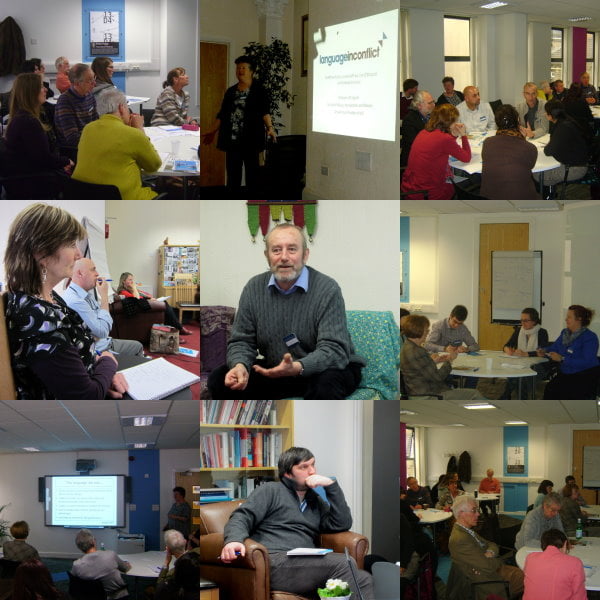Language in Conflict workshops
A big — and the most fun! — part of the Language in Conflict project is the workshops we run for mediators and other conflict resolution professionals. These workshops allow us to explore the kinds of linguistic insights discussed on our website in more detail, and share our ideas with attendees from a wide variety of fields and backgrounds in a friendly and welcoming atmosphere. Besides hopefully imparting some useful linguistic knowledge, this also gives us the valuable opportunity to learn from conflict resolution experts. We are collaborating with our workshop attendees to find ways in which our ideas could be implemented in their work and to refine our own research so that the Language in Conflict project can be an even better resource for those interested in language, conflict and the links and overlaps between the two!
Usually, the workshop sessions open with an opportunity for everyone to introduce themselves and give a brief description of the work that they do. Then, the hard work starts! Our workshops are organised in two 90 minute sessions, one focusing on how language works in interaction, and the other on how we present the world through language. Each session discusses a variety of linguistic concepts that are of significance in conflict situations and contains interactive elements and exercises, giving attendees the opportunity to explore and discuss instances where they have come across these concepts in their own work.
Interaction is led by Dr Jim O'Driscoll, and looks at:
• Face — how we do and don't get on with each other through language.
• Presupposition and implicature — how we manage to understand each other, even when we don't say what we mean.
• Politeness — how we use language to address the wants and needs of ourselves and others.
• Participation frameworks and production formats — how social roles and context affect our language, and the way we understand each other.
The language we use is led by Prof Lesley Jeffries, and explores:
• Naming — how we label the world, and how this affects our understanding of it.
• Negation — the effect of negating, and how it allows us to imagine alternative worlds.
• Modality– how we express what we think will happen, and how it can make us appear confident or unconfident.
• Opposition– how language can make the world binary, and how this can make those in conflict more entrenched.
Our workshops end with a brief feedback session, where we ask attendees to voice their thoughts on the linguistic concepts explored and to suggest avenues for further work for Language in Conflict. These discussions have been invaluable for us in shaping the way we present our ideas and work to others, and we hope that future workshops will give those interested in both language and conflict further great opportunities to talk and work together!
Get involved!
We are planning to hold regular workshop sessions at the University of Huddersfield in the future. However, to be able to also provide our workshops to audiences further afield, we rely on the support of conflict resolution organisations that are willing to host us. We do not want charge a fee for our workshops, but we usually need costs for travel and accommodation to be covered. All we need otherwise is a venue equipped with a screen to show PowerPoint slides. Ideally, we would hold the workshops for the staff of the organisation hosting us, but also invite staff and volunteers from other mediation organisations in the area, if the venue is big enough.

Feedback
"Excellent workshop — lively and informative, well-paced and humoured. Well-planned. Thank you!" — Marion West, University of Wolverhampton
"I enjoyed the workshops and can see how better understanding of language in conflict could aid my practice" — Mike Gaston, Mediation Northern Ireland
"Very informative and will be using what I've learnt" — Qalsoom Khalid, Yorkshire Mediation Services
"It would be interesting to see stronger links between this work and the theories/practice of mediation, how to apply this learning day-to-day in mediation" — Laura Mackey, College of Mediators
"A welcoming and supportive team — thank you to all" — Steve Edwards, Yorkshire Mediation Services
|
Previous workshops
|




